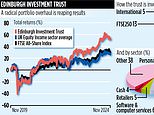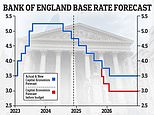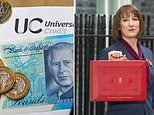How do you find a good accountant? Five tips from a tax expert on when to seek help, hiring the right firm and typical costs

Heather Rogers: Find out how to ask her a tax question in the box below
Heather Rogers, founder and owner of Aston Accountancy, is our tax columnist. Find out how to ask her a tax question in the box below.
She answers the questions people most want to know about hiring an accountant: When do you need one, how do you find someone decent, and what does it cost?
Most people use a solicitor at least once in their lifetime, but not everyone will need an accountant.
However, if you have the right firm in your corner when you really do need help with your finances, it can save a lot of stress and ensure you don't get stuck paying incorrect amounts of tax.
A good accountant will not hesitate to go into battle against HMRC on your behalf when your tax bill is not right.
If you are struggling to fill in your tax return, receiving letters from HMRC that make no sense, or worrying that you are paying too much, it might be time to find one.
1. When is it a good idea to hire an accountant?
The most common scenarios are below, but having sleepless nights over a pending tax bill or return is a sign you might need to get a professional on your side.
Personal
- You seem to be paying a lot of tax through PAYE and your tax code seems to get worse every year but you have no idea what it all means and why
- You are a higher rate taxpayer on PAYE but you have other income from investments or a pension
- You are making pension contributions into a private or work pension and aren’t sure if you are getting the right tax relief, especially if you are a higher rate taxpayer.
- You have been doing your own tax returns for years but now HMRC has opened a tax enquiry into your affairs
- You need tax advice on a personal financial decision you are thinking of taking
- You have no idea regarding inheritance tax or trusts and you need some help - you can use an estate planning solicitor or financial adviser here too
- You have a personal windfall and are unsure how to declare it
- You receive a large redundancy payout and need to include it on a tax return
HEATHER ROGERS ANSWERS YOUR TAX QUESTIONS

- Do I have to pay CGT because I mistakenly undervalued a house for probate?
- How can we cut our controlling, greedy son-in-law out of inheritance AND avoid tax?
- Can parents dodge Labour's VAT on private school fees by paying in advance?
- I've done up a wreck of a house and doubled its value - how can I cut my tax on profits?
- My ex-boyfriend plans to leave me his £2m estate and I'm worried about a huge inheritance tax bill
- How do you find a good accountant? Five tips on when to seek help, hiring the right firm and typical costs
Property
- You have recently sold a property other than your home and you have to pay capital gains tax and make a return to HMRC
- You are a private landlord with rental income
Business
- You are starting up in business or buying a business
- Your business is involved in exporting and importing
- Your firm is growing very fast or you are getting into financial difficulties
- You are already in business and keep your own books either manually or electronically, but now you need to register for VAT and deal with the dreaded Making Tax Digital regime
- You are thinking of employing someone
- You are a sole trader but are considering becoming a limited company or a limited liability partnership
- You have a business to sell or are retiring from one
- You need tax advice on a business decision you are thinking of taking
2. How do you start your search for a good accountant?
Qualifications
Look for someone who is chartered or certified, so you know that you are dealing with an accountant who is qualified.
This also means they will be regulated by an association and will have to hold professional indemnity insurance.
Examples of the larger associations are the Institute of Chartered Accountants, the Association of Chartered Certified Accountants and the Chartered Institute of Taxation.
Chartered or certified accountants have to maintain their standards by completing a certain amount of 'continuous professional development' (CPD) each year.
They may also have good working relationships with other professionals, such as solicitors, financial planners, investment advisers and insolvency practitioners, meaning they can refer you to someone suitable if necessary.
Expertise
Look for an established firm, study the services offered and make sure that they cover your particular problem.
As explained above, most general practitioners will deal with most of the scenarios described above.
However, if your circumstances are more complex, such as tax planning, inheritance tax and trusts, HMRC tax enquiries into your affairs of a complex or serious nature, selling or buying a business, or dealing with international matters, you need someone who specialises in that area.
Word of mouth
Ask your friends, family and colleagues if they have an accountant. A recommendation is always best from someone you know and trust, but do your own research as well.
3. How do you choose the right accountant?
Call or meet
Call them to discuss your needs. It is also a good idea to book a face to face appointment to enable you to meet them and decide if they are for you (and vice versa).
They may ask you to bring ID for the initial meeting.
Under the Money Laundering Regulations, accountants are required to ask for proof of identity (amongst other things) both by way of photographic evidence (passport/driving licence) and proof of address (mortgage statement/utility bill).
They cannot act for you otherwise. We are all used to this with banks and solicitors; accountants are no different. Do not use them if this matter is never raised.
Establishing what you want
Some accountants offer a free initial consultation, but some don’t. You won’t get a lot of free advice, so don’t expect it.
The initial meeting is for the accountant to understand your requirements; they have not engaged you as a client at this stage.
You do, however, get the opportunity to ask them any questions you have, such as their experience with your issue, timescales and costs.
Take information with you regarding your issue that will help them to help you.
Find out the cost
Cheap is not good, value for money is. Remember if they quote you a fixed price, this can change if the issue changes or develops.
Timescales for the work you need done are important. You don’t want to have brought your books and records in only to have them sat on for six months and then get a call two days before the tax payment is due.
Other admin
If you proceed, you will have a letter of engagement identifying the services being provided, the limitations and the responsibilities of both parties.
This should also include terms of business and other documents, depending on why they are being appointed. It should also include costs/hourly rates and payment terms.
You will also need to sign a 64-8 which gives an accountant authority to act on your behalf with HMRC.

Top questions: When do you need an accountant, how do you find someone decent, and what does it cost?
4. What should you expect to pay?
The cost depends on the service you are seeking and the complexity of the matter in hand.
For a basic tax return with some employment income, simple investment income and a pension, you can expect to pay around £200-£300 plus VAT.
For a property disposal and capital gains calculation and form submission, it should cost around £500-£600 plus VAT.
Basic sole trader accounts cost £450 upwards, depending on your business turnover, transactions, how well kept your records are and where you are in the country.
Big London firms will charge a lot more than a smaller high street firm.
Limited company accounts will depend on the structure of your company and the size of your business. Limited company accounts are often more expensive than sole trader accounts.
If you need an audit, then your accountancy fees will run into several thousands of pounds per year.
If you have a complex tax enquiry, or require tax planning or financial planning advice, then you can expect to pay £150 an hour upwards.
Other services will be on a case by case basis and depend who in the firm is carrying out your work.
Feel free to get several quotes, but a very low fee may mean that the service is quite basic.
5. What options do you have if things go wrong?
Talk to your accountant first and try to resolve matters if you are not happy about the service you have received.
If you can’t sort it out with the firm direct, you can complain to their professional association if they have failed in their professional duty.
Associations do not normally get involved in fee disputes, so if it is about that you would have to pursue a civil claim.
THIS IS MONEY PODCAST
-
 Gold price hits record high - should you invest?
Gold price hits record high - should you invest? -
 What does the latest inflation data mean for our finances?
What does the latest inflation data mean for our finances? -
 Is being a Nimby really that bad?
Is being a Nimby really that bad? -
 Have you got the financial confidence to get richer?
Have you got the financial confidence to get richer? -
 Can Labour get Britain growing and make us richer?
Can Labour get Britain growing and make us richer? -
 More of us are falling into the savings tax trap - is it fair?
More of us are falling into the savings tax trap - is it fair? -
 Do Labour or the Tories have the plan Britain needs?
Do Labour or the Tories have the plan Britain needs? -
 What does it take to win the Premium Bonds?
What does it take to win the Premium Bonds? -
 The consumer champion's tricks to fight back
The consumer champion's tricks to fight back -
 What could the general election mean for your money?
What could the general election mean for your money? -
 The mystery of the stolen Nectar Points - and the loyalty sting
The mystery of the stolen Nectar Points - and the loyalty sting -
 Should BofE have cut interest rates instead of holding firm?
Should BofE have cut interest rates instead of holding firm? -
 Mortgage rates are climbing again - should we be worry?
Mortgage rates are climbing again - should we be worry? -
 Is the UK stock market finally due its moment in the sun?
Is the UK stock market finally due its moment in the sun? -
 Will inflation fall below 2% and then spike again?
Will inflation fall below 2% and then spike again? -
 Will the state pension ever be means tested - and would you get it?
Will the state pension ever be means tested - and would you get it? -
 Secrets from an Isa millionaire - how they built a £1m pot
Secrets from an Isa millionaire - how they built a £1m pot -
 Is a 99% mortgage really that bad or a helping hand?
Is a 99% mortgage really that bad or a helping hand? -
 How to sort your pension and Isa before the tax year ends
How to sort your pension and Isa before the tax year ends -
 Will the Bank of England cut interest rates soon?
Will the Bank of England cut interest rates soon? -
 Was the Budget too little, too late - and will it make you richer?
Was the Budget too little, too late - and will it make you richer? -
 Tale of the state pension underpaid for 20 YEARS
Tale of the state pension underpaid for 20 YEARS -
 Will the Budget cut tax - and the child benefit and 60% traps?
Will the Budget cut tax - and the child benefit and 60% traps? -
 Will you be able to afford the retirement you want?
Will you be able to afford the retirement you want? -
 Does it matter that the UK is in recession?
Does it matter that the UK is in recession? -
 Why would the Bank of England cut rates this year?
Why would the Bank of England cut rates this year? -
 You can bag a £10k heat pump discount... would that tempt you?
You can bag a £10k heat pump discount... would that tempt you? -
 Should you stick cash in Premium Bonds, save or invest?
Should you stick cash in Premium Bonds, save or invest? -
 Is the taxman really going after Ebay sellers?
Is the taxman really going after Ebay sellers? -
 What does 2024 hold for investors - and was 2023 a good year?
What does 2024 hold for investors - and was 2023 a good year? -
 How fast will interest rates fall - and where's the new normal?
How fast will interest rates fall - and where's the new normal? -
 Is the mortgage crisis over?
Is the mortgage crisis over? -
 What drives you mad about going to the shops?
What drives you mad about going to the shops? -
 Will the Autumn Statement boost your wealth?
Will the Autumn Statement boost your wealth? -
 How to turn your work pension into a moneyspinner
How to turn your work pension into a moneyspinner -
 Autumn Statement: What would you do if you were Chancellor?
Autumn Statement: What would you do if you were Chancellor? -
 Have interest rates finally peaked - and what happens next?
Have interest rates finally peaked - and what happens next? -
 How much will frozen income tax bands suck out of your pay?
How much will frozen income tax bands suck out of your pay? -
 How much further could house prices fall?
How much further could house prices fall? -
 Will your energy bills rise this winter despite a falling price cap?
Will your energy bills rise this winter despite a falling price cap? -
 Have interest rates peaked or will they rise again?
Have interest rates peaked or will they rise again? -
 Should we keep the triple lock or come up with a better plan?
Should we keep the triple lock or come up with a better plan? -
 Should we gift every newborn £1,000 to invest?
Should we gift every newborn £1,000 to invest? -
 Are you on track for a comfortable retirement?
Are you on track for a comfortable retirement? -
 Where would YOU put your money for the next five years?
Where would YOU put your money for the next five years? -
 Mortgage mayhem has stalled but what happens next?
Mortgage mayhem has stalled but what happens next? -
 Taxman customer service troubles and probate problems
Taxman customer service troubles and probate problems -
 Energy firms rapped for bad service while making mega profits
Energy firms rapped for bad service while making mega profits -
 Inflation eases - what does that mean for mortgage and savers?
Inflation eases - what does that mean for mortgage and savers? -
 Could your bank close YOUR current account with little warning?
Could your bank close YOUR current account with little warning? -
 Energy price cap falling and savings rates race past 6%
Energy price cap falling and savings rates race past 6% -
 Was hiking rates again the right move or is the Bank in panic mode?
Was hiking rates again the right move or is the Bank in panic mode? -
 Mortgage mayhem, savings frenzy: What on earth is going on?
Mortgage mayhem, savings frenzy: What on earth is going on? -
 Money for nothing: Is universal basic income a good idea?
Money for nothing: Is universal basic income a good idea? -
 Inflation-busting savings rates of 9% and cash Isas are back
Inflation-busting savings rates of 9% and cash Isas are back -
 When will energy bills fall, and could fixed tariffs finally return?
When will energy bills fall, and could fixed tariffs finally return? -
 Should we stop dragging more into tax designed for the rich?
Should we stop dragging more into tax designed for the rich? -
 How high will interest rates go... and why are they still rising?
How high will interest rates go... and why are they still rising? -
 How can we build the homes we need - and make them better?
How can we build the homes we need - and make them better? -
 Home improvements: How to add - or lose - value
Home improvements: How to add - or lose - value -
 It's easier to win big on Premium Bonds but should you invest?
It's easier to win big on Premium Bonds but should you invest? -
 How long should you fix your mortgage for - and what next?
How long should you fix your mortgage for - and what next? -
 State pension goes above £10,000 - has something got to give?
State pension goes above £10,000 - has something got to give? -
 April bill hikes - and is it time we ditched the tax traps?
April bill hikes - and is it time we ditched the tax traps? -
 Pensions, childcare, bills and recession: Budget special
Pensions, childcare, bills and recession: Budget special -
 Can you trust the state pension system after these blunders?
Can you trust the state pension system after these blunders? -
 Are we on the verge of a house price crash or soft landing?
Are we on the verge of a house price crash or soft landing? -
 How to make the most of saving and investing in an Isa
How to make the most of saving and investing in an Isa -
 Why is food inflation so high and are we being ripped off?
Why is food inflation so high and are we being ripped off? -
 Could this be the peak for interest rates? What it means for you
Could this be the peak for interest rates? What it means for you -
 Will we raise state pension age to 68 sooner than planned?
Will we raise state pension age to 68 sooner than planned? -
 Could an Isa tax raid really cap savings at £100,000?
Could an Isa tax raid really cap savings at £100,000? -
 Will you be able to afford the retirement you want?
Will you be able to afford the retirement you want? -
 Will 2023 be a better year for our finances... or worse?
Will 2023 be a better year for our finances... or worse? -
 The big financial events of 2022 and what happens next?
The big financial events of 2022 and what happens next? -
 Would you be tempted to 'unretire' after quitting work early?
Would you be tempted to 'unretire' after quitting work early? -
 When will interest rates stop rising and how will it affect you?
When will interest rates stop rising and how will it affect you? -
 Could house prices really fall 20% and how bad would that be?
Could house prices really fall 20% and how bad would that be? -
 Do you need to worry about tax on savings and investments?
Do you need to worry about tax on savings and investments? -
 Have savings and mortgage rates already peaked?
Have savings and mortgage rates already peaked?






































































